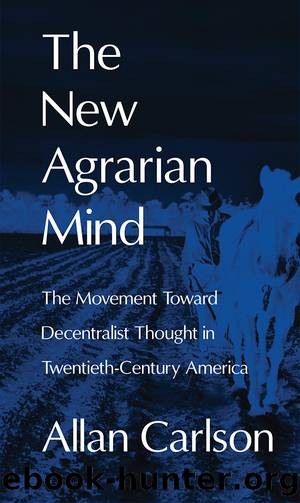The New Agrarian Mind by Allan C. Carlson

Author:Allan C. Carlson [Carlson, Allan C.]
Language: eng
Format: epub
ISBN: 9780765805904
Barnesnoble:
Publisher: Transaction Publishers
Published: 2004-02-28T00:00:00+00:00
A Curious Convergence
Were the Southern Agrarians actually partisans of the New Agrarian Mind? Did they share in the same novel attitudes born in the quintessential^ Yankee mind of Liberty Hyde Bailey? While the direct influence is problematic (although Davidson did emphasize their awareness of âmalcontents even in the North who were asking embarrassing questionsâ),65 the accent surely different, and the writing definitely of higher stylistic caliber, the answer to both questions appears to be yes.
To begin with, the Southerners were fervent believers in the engineering of a whole new economic order. Owsleyâs advocacy for an unprecedented land redistribution, the transformation of property ownership into âa modified form of feudal tenure where, in theory, the...state has a paramount interest in the land,â and the complete reconstruction of the American nation and Constitution were, taken altogether, staggering in their scope.66 Add to this Cauleyâs statement that âDemocracy, both political and economic, is impossible once the principle of the corporation is established,â and his call for abolishing all joint-stock corporations, and you have a political program almost unprecedented in ambition.
Moreover, the needed social engineering would include a thorough remaking of the existing farming population, another New Agrarian idea. Despite Lytleâs words of praise for the Highland Southerners, the Tennessee Agrarians as a group had no more respect for existing farmers than did Bailey, Borsodi, or Bromfield. Ransom decried the âapostasy of American farmers from primary subsistence farming,â terming it âthe greatest disaster our country has yet suffered.â These farmers now were âeconomically ruinedâ and âspiritually desperate,â and in urgent need of reconstruction.67 Owsley concluded that many white tenant farmers of his time were âbeyond redemption,â to be permanently consigned to weak minds, bad food, and disease. He called on county and state pubic health departments âto take the steps necessary to salvage the children of such familiesââpresumably by taking them away from their parentsâso that the offspring of âpoâwhite trashâ might become good farmers and citizens in the future.68 Lanier termed the agrarian project one that demanded âfar-sighted âsocial engineering,ââ including the remaking of the rural population, the huge task of creating âa synthesisâ of rural family and community bonds with âthe energy and inventiveness that has been diverted into industrialism.â69
While their diagnosis was somewhat different, the Southern Agrarians also tended to view rural Christianity and rural churches as problems needing correction. They were advocates for Christian humanism. They were motivated to their project, in part, by the negative publicity surrounding the Scopes trial. And they distrusted scientism. All the same, the Tennessee Agrarians had few good words for the dominant religious expressions of the Southern folk: Baptist, Presbyterian, Methodist, and Church of Christ.
Some of their criticisms did focus on the inroads being made by modernist philosophy. As Lytle urged near the end of âThe Hind Titâ: âturn away from the liberal capons which fill the pulpits as preachers. Seek a priesthood that may manifest the will and intelligence to renounce science and search out the Word in the authorities.â70 Ransomâs book, God
Download
This site does not store any files on its server. We only index and link to content provided by other sites. Please contact the content providers to delete copyright contents if any and email us, we'll remove relevant links or contents immediately.
Room 212 by Kate Stewart(5102)
The Crown by Robert Lacey(4801)
Endurance: Shackleton's Incredible Voyage by Alfred Lansing(4749)
The Iron Duke by The Iron Duke(4345)
The Rape of Nanking by Iris Chang(4194)
Joan of Arc by Mary Gordon(4091)
Killing England by Bill O'Reilly(3989)
Say Nothing by Patrick Radden Keefe(3974)
I'll Give You the Sun by Jandy Nelson(3424)
Shadow of Night by Deborah Harkness(3352)
Hitler's Monsters by Eric Kurlander(3327)
Mary, Queen of Scots, and the Murder of Lord Darnley by Alison Weir(3194)
Blood and Sand by Alex Von Tunzelmann(3190)
Eleanor & Park by Rainbow Rowell(3147)
Darkest Hour by Anthony McCarten(3117)
Margaret Thatcher: The Autobiography by Thatcher Margaret(3072)
Book of Life by Deborah Harkness(2921)
Red Famine: Stalin's War on Ukraine by Anne Applebaum(2917)
The One Memory of Flora Banks by Emily Barr(2853)
